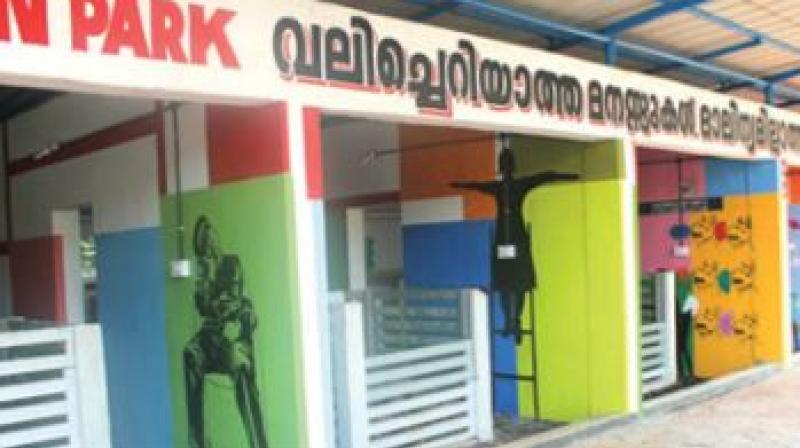Solid approach to solid waste
Is the Alappuzha model of waste management beyond challenges?

Alappuzha municipality was forced to go for decentralized solid waste management in the wake of protests from inhabitants near the dumping site at Sarvodayapuram, and its subsequent closure in 2014. Municipal representatives, civil society members and dedicated employees went for a massive campaign to ensure community behavior change towards household treatment of waste. Integrated Rural Technology Centre (IRTC) and Agency for Nonconventional Energy and Rural Technology (ANERT) lent technical support to the programme by producing and distributing biogas plants and composting units. The programme was implemented in phases, and the first phase was implemented in 12 most urban wards in the municipality.
Most households participated in the programme, opting either biomethanation (biogas plants) or composting. Households which did not have space for waste treatment depended on the community aerobic bin clusters based on Thumburmuzhy model, developed by Dr Francis Xavier of Kerala Veterinary and Animal Sciences University. The first phase of the programme ended in 2016 and the successful implementation of decentralized waste management in these 12 wards out of 52 has been heralded as the successful Alappuzha model. The second phase of implementation of the programme is under way. In early 2017, a research was undertaken under Public Policy Research Institute in 12 wards to examine the implementation aspects and their sustainability.
During the survey of households in 2017 early, it was found 75 percent used biogas plants (portable or fixed) and the rest used either pipe compost or aerobin clusters. Most households abandoned pipe compost because of frequent rodent attacks and aversion to smell and worms. The second phase of the programme consequently promotes kitchen bins. Among households that used biogas plants, 62 percent continued using the technology and 38 percent discontinued. Why did some households discontinue the technology? Was it because the technology failed, or was it because of any other factors? The primary survey showed that most households in Alappuzha which used biogas plants faced issues with technology such as blockage and burner complaints. Once a biogas plant is blocked, the waste in the plant has to be removed, cleaned and refilled with cow dung, to restart the process.
To provide after-installation service to households, IRTC has trained Kudumbashree women. However, households that discontinued using biogas plants mentioned that frequent operational issues and lack of service forced them to drop the technology. Interviews with service providers (Kudumba shree women) reveal that a shortage in the number of women service providers affected the provision of timely services. Moreover, free service is provided only in the first year of the installation.
Similarly, the stove burner got blocked frequently. Burning of biofuel produces ash, which blocks holes, and frequent cleaning is required. People were unaware of this and were disillusioned with the technology. The maximum life of a burner, according to the households, is one year. Frequent issues with the use of technology, lack of timely services, recurring costs and little biofuel generated by biogas plants have been mentioned as reasons for the discontinuation of biogas plants. Limits in generation of biofuel may be because of the lesser amount of waste treated in the plant.
Households, which abandoned technologies, either dug pits for dumping waste on the premises or threw it in nearby canals. According to municipal officials, the demand for biogas plants has reduced in the second phase of the programme. The biogas plant as a technology has less acceptance in the city now when compared to the initial phase. The issue, however, lies not particularly with the technology but with awareness about how to use the technology, and the availability of the service. That is the key problem with different aspects of implementation.
Aerobic bun clusters are key to success
Community aerobic bin clusters have performed reasonably well in the town. Health Inspectors in the town have organized the contingent workers to maintain the community structures. Aerobin clusters provide two kinds of services in Alappuzha. One is composting and the other is collecting of recyclable wastes to deliver to Amala Eco-Clean for recycling. While some households have been using the composting service, the primary survey shows that 80 percent of households burned their plastics because of sheer ignorance of services provided by aerobin clusters. This clearly reveals that the focus of the campaign has been merely on biodegradable waste treatment at households, and not on treating plastic waste.
A transition in waste management from a centralized waste management system to a decentralized system requires behaviour change in society, and technological innovations and their effective implementation. While massive campaign and surveillance helped in behavioural change, technological innovations made the transition possible in Alappuzha. Households were willing to bring changes in society. However, the study shows that there are some issues with the implementation of the programme in terms of provision of after-installation services, awareness generation towards the use of technologies, and the provision of recycling services, which affect the progression of change.
All the five cities selected by the UNEP focus on just one part of the solid waste management chain, that is, either treatment of biodegradable waste, or recyclable waste. Alappuzha has been recognized for its endeavours towards treatment of biodegradable waste. However, it is widely accepted that burning of recyclable wastes equally pollutes the environment. Alappuzha could be a town that tops in the treatment of both degradable and recyclable waste. While in the second phase Alappuzha plans to focus on challenges in implementation of the existing programme with a special reference to consumer satisfaction in using technology; it should also focus on increasing recycling rates.
(The author is assistant professor at Tata Institute of Social Sciences, Mumbai).

